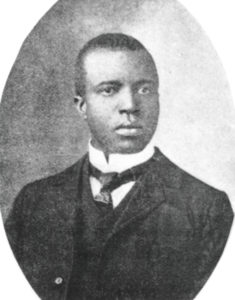
Composer Profile: Scott Joplin, ‘Father of Ragtime’
By David SalazarScott Joplin was one of America’s most renowned black composers, garnering the title of “King of Ragtime.”
Born in 1868 as the second of six children to an ex-slave from North Carolina and a freeborn woman from Kentucky, his birthday and place of birth remain points of contention to this day.
He grew up in Arkansas and learned basic music training from his parents. By the age of seven, he was allowed to play the piano. While his parents would be separated in his childhood, he would continue to pursue his passion for music with the help of Julius Weiss, who would have a lasting effect on the young composer.
In the 1880s, Joplin took up a life as a traveling musician, though he struggled during this initial attempt. By 1893, he formed his first band in Chicago, gaining some degree of popularity.
From there he would move to Missouri where he would go on to create some of his most renowned compositions, including “The Entertainer,” “March Majestic,” and “The Ragtime Dance.”
He also created an opera company of 30 people to produce his first opera “A Guest of Honor.” Unfortunately, someone associated with the company stole box office receipts and Joplin was unable to meet the company’s payroll and rent. The score for this first opera was subsequently lost during this time.
In his later years, Joplin moved to New York where he would work on his last opera “Treemonisha.” He performed it in a private setting with piano accompaniment to poor results. The opera would not get its due until the 1970s, several decades after the composer had died; he passed away in 1917 after being admitted to a mental institution for syphilitic dementia.
Signature Works
He has a number of famed works, but the focus here will be on “Treemonisha,” his great opera. The composer wrote the libretto for his mythic opera, which has drawn comparisons to Wagner’s own Ring operas; the work features many of the art form’s conventions as well. The opera tells the story of a young woman who learns to read from a white woman and then tries to lead her community out of ignorance and superstition.
Watch and Listen
Check out a recording of “Treemonisha” with a preface from the composer’s grandniece LaErma White.
Check out this live-recorded performance.
Categories
Opera Wiki

